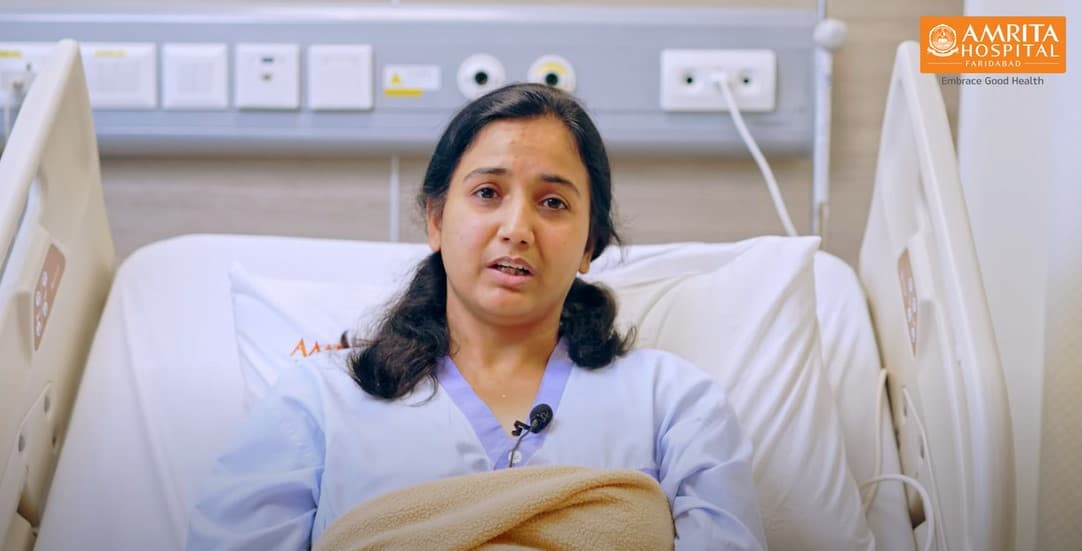Overview
Department of General Surgery at Amrita Hospital, Faridabad, is a Broad Speciality offering a wide variety of services. It is equipped with Minor Operation Theatres, Critical Care (SICU) and Major Operation Theatres. It is also gearing up to train both Undergraduate and Postgraduate students at Amrita School of Medicine Faridabad.
We can help the patients who have
- Head and Neck Swellings
- Breast Lumps
- Abdominal Pain, Abdominal Masses
- Groin Swellings
- Bleeding Per Rectum
- Varicose Veins
- Diabetic Foot Infections
Specialities
- General Surgery
- Minimal Access Surgery
- Laser Proctology
Disease Treated
- Neck Swellings
- Breast Lumps
- Appendicitis
- Gall stones
- All types of Herniae
- Piles, Fissure, Fistula
- Pilonidal Sinus
Out Patient Services
We can help the patients who have:
- Head and Neck Swellings,
- Breast Lumps,
- Abdominal Pain, Abdominal Masses,
- Groin Swellings,
- Bleeding Per Rectum,
- Varicose Veins,
- Diabetic Foot Infections
Minor Procedures
- Excision of various swellings
- Drainage of Abscess
- Suturing of CLWs
- Nail Removal
- Aspirations of Fluid, Pus, Blood
- Foreign Body Removal
- Dressings of wounds
Why Choose Us ?
We have two Senior Eminent and experienced Consultants with vast experience in the field of General and laparoscopic surgery and laser proctology.
By choosing us , patients will get best of services in above mentioned fields
What we offer
- Out patient and In patient Care
- Day care surgeries
- Elective and Emergency Surgeries
- Critical Care (SICU)
Services
Head & Neck and Breast
- Surgeries of Salivary Glands – Parotid and Submandibular Glands
- Surgeries of Thyroid and Parathyroid Glands
- Surgeries of Various Neck Swellings – Lymph Nodes etc.
- Surgeries of Breast – Benign
Abdominal Operations – Emergency
Laparotomy for:
- Perforations - Gastric Ulcer, Duodenal Ulcer, Small intestine, Colonic
- Obstruction - Small bowel, Colonic
- Volvulus - Gastric, Simple & Compound
- Abdominal Trauma - Liver & Splenic Injury
- Bowel & Mesenteric Injuries
Hernia Repairs
- Epigastric hernia
- Umbilical hernia
- Inguinal Hernia
- Femoral hernia
- Incisional hernia
- Interstitial hernia
Surgeries on Genetalia
- Circumcision
- Meatotomy, Meatoplasty
- Varicocele
- Hydrocele
- Epidydimal Cyst
- Spermatocele
- Testicular Tumors
Anal and Perianal Surgeries
- Fissurectomy
- Fistulectomy
- Haemorrhoidectomy
- Pilonidal Sinus Excision
- Perianal Abscess
Laser Proctology
- Fistula in ano
- Haemorrhoides
- Pilonidal Sinus
Miscellaneous
- Trendelenburg Operation for Varicose Veins
- Sclerotherapy
- Disarticulations
- Amputations
- Debridement
- Split Skin Grafting
- Soft tissue Tumours
Abdominal Operations – Elective
- Diagnostic Laproscopy.
- Laparoscopic surgery for appendix, gall blader stones and all types of hernia
- Heller’s Cardiomyotomy, Fundoplication
- Vagotomy, Gastrojejunostomy, Pyloroplasty
- Gastrectomy
- Small Bowel Resection & Anastomosis
- Colon Resections – Hemicolectomy
- Appendectomy, Meckel’s Diverticulectomy
- Cholecystectomy, CBD Exploration
- Choledochal Cyst Excision with Hepaticojejunostomy
- Pancreaticojejunostomy, Distal Pancreatectomy
- Splenectomy, Splenorrhaphy
Facilities
- Well equipped out patient area with four examination rooms
- Dressing rooms 2 – 1for men and 1 for women
- Fully equipped minor operation theatre with crash cart
- Faculty offices
- State of the art major operation theatres (4 No) with facilities for open and minimal access surgeries
- SICU with 10 beds
FAQ
- Heartburn, frequent acidity, nausea, or vomiting, especially after consuming a fatty meal.
- Pain in the upper right abdomen that may radiate to the back.
- Jaundice.
- Laparoscopic cholecystectomy: This is a commonly performed surgery for gallstones, where small incisions measuring 1 cm or less are made, typically using a laparoscope.
- Open cholecystectomy: In this procedure, a larger incision is made in the upper right abdomen, and the patient may need to stay hospitalized for a few days.
- Minimally invasive procedure.
- Reduced blood loss.
- Shorter hospital stays.
- Faster recovery.
If left untreated, gallstones can lead to the following complications:
- Inflammation or infection of the gallbladder, resulting in severe pain and fever. It is more common in male patients and those with diabetes.
- Blockage of the common bile duct, causing symptoms such as severe pain, jaundice, and high-grade fever.
- Blockage of the pancreatic duct, which can lead to pancreatitis (inflammation of the pancreas) characterized by intense and constant abdominal pain, often requiring immediate hospitalization and intensive care. In some cases, it can be fatal.
- Increased risk of developing gallbladder cancer in individuals with untreated gallstones.
- No need to avoid vegetables or fruits with seeds, but fried foods should be avoided.
- Follow any dietary restrictions based on your medical condition, such as diabetes.
- Incisions from laparoscopic surgery are covered with water-resistant dressings, allowing normal bathing.
- Activities like climbing stairs and walking can be resumed, and other forms of exercise can gradually be reintroduced after one week of the operation.
A hernia is a condition where there is weakness or tears in the abdominal muscles, allowing fatty tissue or organs, such as the intestines, to protrude through the weakened area. It often occurs in the groin but can happen in other parts of the body as well.
- Inguinal Hernia
- Umbilical Hernia
- Ventral Hernia (including Epigastric Hernia, Paraumbilical Hernia, and Incisional Hernia)
- Femoral Hernia
Surgery is the only effective treatment for hernias. If left untreated, hernias can increase in size and potentially lead to intestinal blockage, which requires immediate medical attention.
- Open surgery
- Laparoscopic surgery
Regardless of the surgical approach, the use of mesh reduces the risk of recurrence.
The most suitable technique for hernia repair varies for each patient. The surgeon will evaluate the patient's condition and choose between open surgery or laparoscopic surgery.
- Avoid straining during urination and bowel movements.
- Avoid lifting heavy weights.
- Non-surgical:
- Rubber band ligation
- Sclerotherapy
- Surgical:
- Open surgery
- Stapler surgery
- Laser surgery
- Pain and discomfort
- Bleeding
- It is important to maintain cleanliness at the surgical site to prevent infection.
- Regularly taking sitz baths can help with healing and relieve discomfort.
- Extra strain on the surgical site should be avoided.
- A high-fiber diet is recommended, while spicy foods should be avoided.
- Staying hydrated by drinking 8-10 glasses of water per day is important.
- During bowel movements, it is advisable not to exert excessive strain.
- Stool softeners can be taken to prevent straining.
- Ointments or creams prescribed by the doctor should be applied as directed.
AA fissure, also known as anal fissure, is a small cut or tear in the thin, moist tissue (mucosa) that develops in the lining of the anal opening. It may lead to pain, bleeding during bowel movements, and discomfort while walking, standing, or sitting.
20-35 percent of India’s population are reported to have anal fissures. Anal fissure is highly observed in the urban (18%) and suburban (12%) populations. It equally affects both men and women and most often occurs in adults aged 15-40.However, the prevalence of fissure was higher in men (19.41%) than women (14.14%) and higher in people aged between 18-40 years than 41-60 years.
The following are the most common symptoms of anal fissure:-
- Anal bleeding
- Rectal pain
- Itchiness
- Cracked skin
- Small lump or skin tag
The treatment of anal fissure depends on various factors such as the type, cause, symptoms, and severity of the condition. Mild cases can often be addressed by addressing the underlying causes and making dietary and lifestyle changes. These changes may include increasing water intake, taking stool softeners, avoiding dehydration-causing substances like caffeine, and practicing sitz baths with warm water to relax the anal muscles and alleviate pain and discomfort. It is also important to maintain proper hygiene and use prescribed creams or ointments to lubricate the affected area.
If non-surgical treatments do not provide relief for chronic or severe anal fissures, surgery may be recommended. There are two main surgical options: open surgery and laser surgery. Open surgery is a traditional approach, while laser surgery is a more advanced and effective method that can provide a lasting cure for anal fissures.
Doctors employ various surgical methods to treat anal fistulas, and the most suitable approach depends on the severity and location of the fistula tract. One common method is a fistulotomy, where the tract is opened or unroofed to promote healing from the inside out. Although fistulotomies have a high success rate, they carry a risk of incontinence if the sphincter muscle is damaged. In cases where the fistula crosses the sphincter, alternative surgical techniques such as LIFT or flap procedures may be used.
In addition to surgical options, there are less invasive treatment alternatives available. Minimally invasive procedures offer a quicker recovery time and a reduced risk of complications. These treatments may involve using glue or plugs to fill the fistula tract, or utilizing laser ablation.
Laser procedures entail the insertion of a specialized probe into the fistula tract. As the laser moves along the passage, it emits energy that removes or ablates the tissue, effectively sealing the tract. Studies have reported success rates ranging from 71% to 81% for laser ablation procedures.




